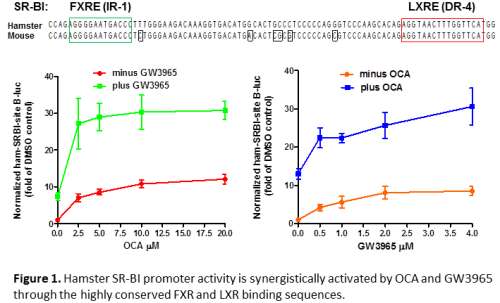
Jingwen Liu
Veterans Affairs Palo Alto Health Care System, USA
Title: FXR activation by obeticholic acid induces hepatic SR-BI gene expression through a novel mechanism of transcriptional synergy with the nuclear receptor LXR
Biography
Biography: Jingwen Liu
Abstract
 The farnesoid X receptor (FXR) and liver X receptor (LXR) are known to regulate distinct biological pathways in BA synthesis and cholesterol metabolism. Obeticholic acid (OCA) is an FXR agonist being developed for treating various chronic liver diseases. Previous studies reported inconsistent effects of OCA on regulating plasma cholesterol levels in different animal models and in different patient populations. The mechanisms underlying its divergent effects yet have not been thoroughly investigated. The scavenger receptor class B type I (SR-BI) is an FXR modulated gene and the major receptor for HDL-C. We recently showed that OCA treatment effectively lowered plasma HDL-C levels and increased hepatic SR-BI expression in hypercholesterolemic hamsters but not in normolipidemic hamsters, suggesting that hepatic cholesterol might play a role in OCA-induced SR-BI transcription. In this current study, by conducting genomic sequence analysis, reporter assays and direct DNA binding assays, we have identified a highly conserved regulatory region in the first intron of hamster SR-BI gene that contains a functional FXRE motif and an LXRE site separated by 57 base pairs. Promoter reporter activity assays demonstrated the functional involvement of this critical regulatory region in SR-BI gene transcription upon activations of FXR and LXR in a synergistic fashion. In vivo studies of normolipidemic hamsters showed that hepatic SR-BI gene expression is not affected by separate treatment of OCA or LXR agonist GW3965 but the co-activation of FXR and LXR by the combined treatment of OCA and GW3965 results in significant increases in hepatic SR-BI mRNA and protein levels. Taken together, we have discovered an unprecedented cross-talk between FXR and LXR that leads to a synergistic activation of SR-BI gene transcription in liver tissue and consequently affected HDL-C metabolism. Our novel findings shed new light for a better understanding of lipid regulatory effects of OCA in hyperlipidemic patients.
The farnesoid X receptor (FXR) and liver X receptor (LXR) are known to regulate distinct biological pathways in BA synthesis and cholesterol metabolism. Obeticholic acid (OCA) is an FXR agonist being developed for treating various chronic liver diseases. Previous studies reported inconsistent effects of OCA on regulating plasma cholesterol levels in different animal models and in different patient populations. The mechanisms underlying its divergent effects yet have not been thoroughly investigated. The scavenger receptor class B type I (SR-BI) is an FXR modulated gene and the major receptor for HDL-C. We recently showed that OCA treatment effectively lowered plasma HDL-C levels and increased hepatic SR-BI expression in hypercholesterolemic hamsters but not in normolipidemic hamsters, suggesting that hepatic cholesterol might play a role in OCA-induced SR-BI transcription. In this current study, by conducting genomic sequence analysis, reporter assays and direct DNA binding assays, we have identified a highly conserved regulatory region in the first intron of hamster SR-BI gene that contains a functional FXRE motif and an LXRE site separated by 57 base pairs. Promoter reporter activity assays demonstrated the functional involvement of this critical regulatory region in SR-BI gene transcription upon activations of FXR and LXR in a synergistic fashion. In vivo studies of normolipidemic hamsters showed that hepatic SR-BI gene expression is not affected by separate treatment of OCA or LXR agonist GW3965 but the co-activation of FXR and LXR by the combined treatment of OCA and GW3965 results in significant increases in hepatic SR-BI mRNA and protein levels. Taken together, we have discovered an unprecedented cross-talk between FXR and LXR that leads to a synergistic activation of SR-BI gene transcription in liver tissue and consequently affected HDL-C metabolism. Our novel findings shed new light for a better understanding of lipid regulatory effects of OCA in hyperlipidemic patients.

